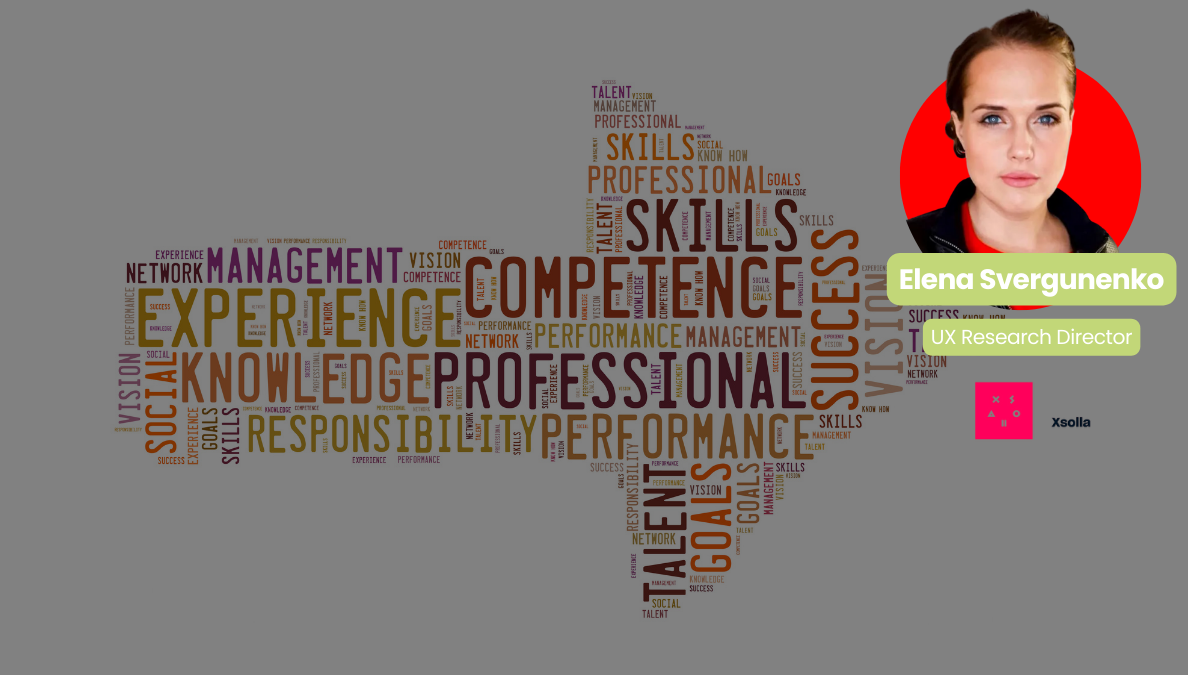Mapping UX Research Competencies for Business Growth
UX360 Talks with Elena Svergunenko, UX Research Director at Xsolla

UX Research Director,
Xsolla
Elena Svergunenko serves as the UX Research Director at Xsolla, a global leader in video game commerce. She leads a dedicated team of UX researchers, employing diverse methodologies to enhance customer experiences and fuel product innovation. With a focus on strategic alignment, Elena develops cross-functional processes that streamline collaboration and deliver measurable value for both users and businesses in the dynamic gaming industry.
UX360: What motivates you to join the UX360 conference and what is the core message of your talk?
Elena: UX Research doesn’t just uncover user insights—it shapes business decisions. My workshop, “Mapping UX Research Skills for Business Growth,” is designed to help research leaders structure their teams for consistent quality, career growth, and strategic impact.
We’ll focus on defining key competencies, improving processes, and planning career paths so UX Research becomes a scalable driver of innovation, not just a support function. A core tool in this approach is the UX Research Competency Map, which helps teams align research skills with business goals and foster long-term growth.
UX360: How has this impacted your own work and career?
Elena: A structured competency framework has transformed my career. It provides clarity for early-career researchers, helps senior researchers transition into leadership, and enables companies to build strategic research functions.
For me, this approach has been a game-changer in mentoring, hiring, and developing teams that don’t just generate insights but shape product and business strategy. It ensures that research has a measurable impact rather than being siloed or underutilized.
UX360: How has UX as a practice evolved in the last couple of years, and how would you like to see it evolve in the next few?
Elena: UX Research has become an integral part of business strategy. But as AI reshapes industries, business itself is evolving, demanding a new level of engagement from researchers. It’s no longer just about leveraging AI as a tool for research, it’s about deeply understanding the experiences AI-driven products create.
How do we design AI-powered interactions that feel seamless, intuitive, and truly adaptive? What defines usability when the user is engaging with an AI model that continuously evolves?
These are the questions shaping the future of UX.
And to create truly meaningful AI-driven products and services, researchers must first develop their own AI experience. Understanding AI isn’t just about tools and automation, it’s about building a critical perspective, refining judgment, and developing a trained eye for how AI shapes interactions.
That’s why the UX Research Competency Map reflects these shifts, integrating AI-related skills as essential for modern UX researchers. AI-driven research methods, automation strategies, and human-AI interaction principles aren’t optional anymore. They’re becoming core research competencies.
UX360: Given this evolution, what are two expected and two less obvious skills UXers should possess, and why?
Elena:
Expected:
- AI-assisted Research: researchers need to work with large datasets, automate tasks, and critically evaluate AI-generated insights. Research must remain rigorous and unbiased, even with automation.
- Strategic Thinking: AI is automating operational research tasks, so UXers must focus on interpretation and decision-making. Connecting insights to business goals is key to staying relevant.
Less obvious:
- Business research mindset: UX researchers can no longer operate in isolation from business strategy. To drive real impact, they need to be as fluent in business metrics as they are in product metrics. This means understanding market dynamics, CX methodologies, and industry trends at a strategic level. The ability to connect research with revenue, retention, and growth, to anticipate shifts in customer behavior, and to align UX with business objectives is what sets high-impact researchers apart.
- Ethics and bias detection in AI Research: AI is only as good as its training data. UX researchers must identify bias in AI-generated findings, challenge flawed data, and advocate for ethical AI usage. As AI becomes embedded in decision-making, this skill will be critical.
UX360: Apart from work, what can delegates at the event talk to you about? Do you have any particular personal interests, hobbies, or extracurricular activities and engagements?
Elena: I love discussing gaming, traveling, and the best places to visit in and around Berlin.
UX360: Last but not least, favourite recommendations to make to industry colleagues for inspiration, innovation, guidance, and leadership:
Elena: Jakob Nielsen’s writings are unparalleled in their depth, offering a clear understanding of UX. He doesn’t just document changes—he explains why they happen, where they’re leading, and what we, as researchers, should do about them.
I love Inspiring Women In CX podcast, hosted by Clare Muscutt. It brings together some of the brightest female minds, exploring what it takes to create truly unique and impactful experiences.
But nothing compares to real-life meetups and exchanging experiences over coffee or a glass of wine :). No article or trend report can replace that, since the most valuable ideas come from people coming together and talking!
UX360: Thank you so much, Elena! We look forward to hearing more from you at UX360 Europe 2025!
It’s your last chance to register for the UX360 Research Summit 2025 and meet UX research leaders in person!
The ultimate gathering of UX research and design leaders is here—two days packed with the latest industry insights, cutting-edge methodologies, and next-level inspiration.
This year, the summit features 30+ industry leaders from global powerhouses such as Google, Roche, IKEA, Meta, Nestle, and many more.
Network with world-class UX professionals from around the globe. Whether you’re a researcher or designer, this event is a must-attend for anyone looking to stay ahead in the field. Last chance to register!










 by
by 


